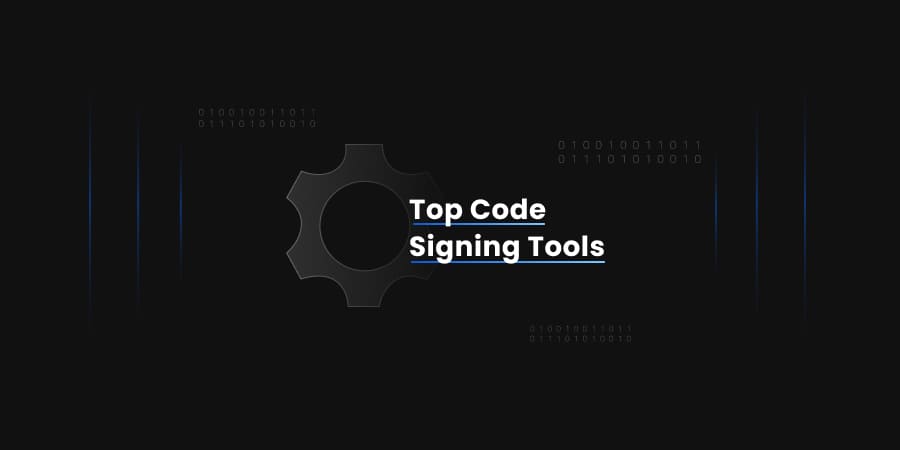- What is Code Signing and why does it matter in Software Supply Chains?
- The Risks of Unsigned or Improperly Signed Code in DevOps
- Why Modern Development Requires Automated, Scalable Code Signing
- Introducing CodeSign Secure by Encryption Consulting: Built for Secure Software Delivery
- How CodeSign Secure Helps You Meet Compliance Requirements (SOC 2, NIST, ENISA, etc.)
- Comparing CodeSign Secure with Traditional Code Signing Methods
- Conclusion
What is Code Signing and why does it matter in Software Supply Chains?
Code signing is a way to prove that a piece of software came from a trusted source and hasn’t been tampered with. It’s like sealing a letter with a signature; anyone who receives it knows who sent it and that it wasn’t opened or changed along the way.
In the world of software supply chains, this matters a lot. Code often passes through many hands of developers, build systems, and automation tools before it gets to the end user. Without proper code signing, there’s no easy way to tell if something was changed, injected with malware, or spoofed by an attacker pretending to be someone else.
Code signing helps stop those kinds of attacks. It keeps software trustworthy, builds user confidence, and ensures that only verified code makes it into production. Think of it as a digital handshake between you and your users, telling them, “Yes, this really came from us, and it’s safe to run.”
The Risks of Unsigned or Improperly Signed Code in DevOps
In fast-moving DevOps environments, things get built, tested, and shipped at high speed. But if your code isn’t signed or worse, signed the wrong way, it opens the door to all kinds of problems.
First off, unsigned code makes it easy for attackers to slip in malicious files without anyone noticing. It could be a fake library, a tampered binary, or a script that looks legit but isn’t. Without a trusted signature, there’s no way to tell if the code actually came from your team or if it was swapped somewhere in the pipeline.
Improperly signed code isn’t much better. Maybe the keys were stored in plain text. Maybe the signing process wasn’t controlled. Either way, it’s like putting a security badge on someone without checking their ID. The badge means nothing if anyone can issue one.
For DevOps teams, this kind of slip-up can lead to serious trouble, supply chain attacks, compliance violations, broken builds, and loss of user trust. When you push code frequently, you need to make sure every piece of it can be trusted. That’s why getting code signing right isn’t optional; it’s essential.
Why Modern Development Requires Automated, Scalable Code Signing
Let’s be honest, manual code signing doesn’t cut it anymore. In today’s development world, teams are pushing updates daily (sometimes hourly), and builds are flying through CI/CD pipelines around the clock. Trying to handle code signing manually in that kind of setup is a bottleneck waiting to happen.
You’ve got developers waiting for signatures, security teams chasing key approvals, and release managers juggling files between systems. It’s messy, slow, and easy to get wrong.
Automated code signing fixes that. It fits right into your existing tools and workflows, signs code as part of the pipeline, and logs everything for audits without slowing anyone down. Add scalability to the mix, and now you can handle dozens or hundreds of signing requests across multiple teams and projects without breaking a sweat.
It’s not just about convenience; it’s about keeping security in place without putting the brakes on your release speed. When code signing is built to scale and runs automatically, everyone wins. Developers move faster, security stays strong, and you’re always ready for the next release.
Introducing CodeSign Secure by Encryption Consulting: Built for Secure Software Delivery
Our CodeSign Secure is built to take the hassle out of code signing, without cutting corners on security. It’s made for teams that want to move fast but still need to know their code is safe, verified, and trusted from build to release.
With our platform, you can sign code automatically as part of your CI/CD pipelines, control who can sign what, and store your keys securely using HSMs or PKCS#11 integrations. No more risky key sharing, scattered scripts, or last-minute signing delays.
It works smoothly with tools you already use, like Bamboo and TeamCity, and helps you stay on top of compliance and audit requirements without adding extra work. Whether you’re a growing startup or a large team with hundreds of builds a day, our platform keeps things simple, secure, and scalable.
It’s security that fits right into your flow, no drama, no slowdown.
Ensure Code Integrity and Publisher Authenticity at Every Stage
When your code is signed with our CodeSign Secure, anyone who uses it knows two things: it came from you, and it hasn’t been tampered with. Whether it’s a library, script, or full release, the signature travels with it. So even if your software moves across teams, environments, or customers, the trust stays intact.
Defend Against Supply Chain Attacks like Dependency Confusion and Malware Injection
Attackers love to sneak into the build process when no one’s watching. Our platform helps shut that door. By signing everything that leaves your pipeline, you make it clear what’s real and what’s not. That means no fake packages getting pulled in, no shady updates slipping through, and no guessing if a file should be trusted.
Automate Code Signing Across DevOps Pipelines with Ease
Nobody wants to manually sign builds anymore. Our platform plugs right into your pipeline and handles the signing for you with no extra steps or delays. Your team keeps pushing code, CodeSign Secure signs it behind the scenes, and you stay compliant and secure without adding to your to-do list.
Seamlessly Integrate with Popular CI/CD Tools like Bamboo and TeamCity
CodeSign Secure was built to work with the tools you already use. If your team runs builds through Bamboo, Jenkins, Azure DevOps, GitLab, GitHub Actions, or TeamCity, integration is simple. Signing becomes just another step in your workflow. Set it up once, and let it run with every build.
Enforce Security Policies with Centralized Key Management
Scattered keys are a problem waiting to happen. Our platform keeps things in check with centralized key control. You can define who’s allowed to sign, when they can do it, and what they’re allowed to sign. It’s all managed in one place, with logs to prove it.
Maintain SBOM Compliance with Audit-Ready Singing Workflows
Software Bills of Materials (SBOMs) are becoming a must, and our platform helps you stay compliant. Every signed artifact can be traced, verified, and logged, so when it’s time for an audit or compliance check, you’re not scrambling. You’ve got clean records and clear proof of every signing event.
Support for Hardware-Backed Signing with HSM and PKCS#11
Security matters, and our platform lets you do it the right way. You can back up your keys with a hardware security module (HSM) or integrate via PKCS#11. That means private keys stay protected at all times, no shortcuts, no exposed secrets, just safe, compliant signing.
How CodeSign Secure Helps You Meet Compliance Requirements (SOC 2, NIST, ENISA, etc.)
Security rules aren’t optional anymore, whether it’s SOC 2, NIST guidelines, or ENISA recommendations, teams are expected to prove they’re doing things the right way. That includes showing how you protect your code, control access to signing keys, and track who did what.
CodeSign Secure makes that part easier. It gives you policy controls, audit logs, and key protection that line up with what these standards expect. You can show auditors that every signed artifact came from an approved process, with proper key handling and traceable records.
Instead of piecing together screenshots and spreadsheets, you get a clean trail of who signed what, when, and how. It keeps your team focused on shipping code while helping you stay out of trouble when compliance checks roll around.
Comparing CodeSign Secure with Traditional Code Signing Methods
Traditional code signing usually means someone has access to a signing key stored on a local machine or in a shared folder. Maybe it’s protected by a password, maybe not. Scripts are passed around, keys get reused, and signing becomes a messy manual step that slows things down and increases risk.
Our CodeSign Secure flips that on its head.
Instead of passing keys around, our platform locks them down securely, stored in HSMs or accessed through PKCS#11. Signing isn’t something you do at the last minute; it’s baked into your pipeline from the start. No waiting, no guesswork, and no hunting for who last used the key.
Plus, with our CodeSign Secure, everything is tracked. Every signature has a record. Every key is protected. And your team doesn’t need to stop what they’re doing to deal with security.
It’s a smarter, cleaner way to sign code built for teams that don’t want security to be an afterthought.
Conclusion
Code signing isn’t just a checkbox; it’s how you prove your code can be trusted. In today’s fast-paced development cycles, manual signing methods just don’t cut it anymore. You need something that fits into your workflow, keeps your keys safe, and lets your team move without friction. That’s where CodeSign Secure by Encryption Consulting comes in.
It takes the pain out of signing by automating the hard parts, locking down your keys, and making sure every release is secure, traceable, and compliant. Whether you’re pushing daily builds or managing large-scale releases, our platform gives you the tools to do it right.
So, if you’re ready to secure your software supply chain without slowing things down, it’s time to make the switch.
- What is Code Signing and why does it matter in Software Supply Chains?
- The Risks of Unsigned or Improperly Signed Code in DevOps
- Why Modern Development Requires Automated, Scalable Code Signing
- Introducing CodeSign Secure by Encryption Consulting: Built for Secure Software Delivery
- Ensure Code Integrity and Publisher Authenticity at Every Stage
- Defend Against Supply Chain Attacks like Dependency Confusion and Malware Injection
- Automate Code Signing Across DevOps Pipelines with Ease
- Seamlessly Integrate with Popular CI/CD Tools like Bamboo and TeamCity
- Enforce Security Policies with Centralized Key Management
- Maintain SBOM Compliance with Audit-Ready Singing Workflows
- Support for Hardware-Backed Signing with HSM and PKCS#11
- How CodeSign Secure Helps You Meet Compliance Requirements (SOC 2, NIST, ENISA, etc.)
- Comparing CodeSign Secure with Traditional Code Signing Methods
- Conclusion




